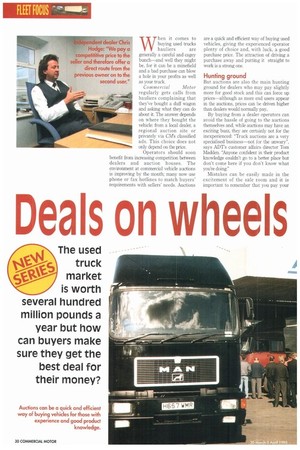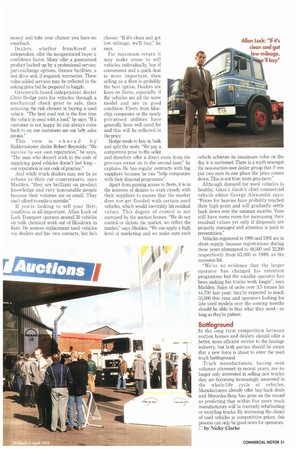W hen it comes to buying used trucks
Page 32

Page 33

If you've noticed an error in this article please click here to report it so we can fix it.
hauliers are generally a careful and cagey bunch—and well they might be, for it can be a minefield and a bad purchase can blow a hole in your profits as well as your truck.
Commercial Motor regularly gets calls from hauliers complaining that they've bought a duff wagon and asking what they can do about it. The answer depends on where they bought the vehicle: from a local dealer, a regional auction site or privately viaOils classified ads, This choice does not only depend on the price.
Operators should soon benefit from increasing competition between dealers and auction houses. The environment at commercial vehicle auctions is improving by the month; many now use phone or fax hotlines to match buyers' requirements with sellers' needs. Auctions are a quick and efficient way of buying used vehicles, giving the experienced operator plenty of choice and, with luck, a good purchase price. The attraction of driving a purchase away and putting it straight to work is a strong one.
Hunting ground
But auctions are also the main hunting ground for dealers who may pay slightly more for good stock and this can force up prices—although as more end users appear in the auctions, prices can be driven higher than dealers would normally pay.
By buying from a dealer operators can avoid the hassle of going to the auctions themselves and, while auctions may have an exciting buzz, they are certainly not for the inexperienced: "Truck auctions are a very specialised business—not for the unwary", says ADT's customer affairs director Tom Madden. "Anyone confident in their product knowledge couldn't go to a better place but don't come here if you don't know what you're doing."
Mistakes can be easily made in the excitement of the sale room and it is important to remember that you pay your money and take your chance: you have no comeback.
Dealers, whether franchised or independent, offer the inexperienced buyer a confidence factor. Many offer a guaranteed product backed up by a professional service, part-exchange options, finance facilities, a test drive and, if required, warranties. These value-added services may be reflected in the asking price but be prepared to haggle.
Greenwich-based independent dealer Chris Hodge puts his vehicles through a mechanical check prior to sale, thus removing the risk element in buying a used vehicle, "The best road test is the first time the vehicle is used with a load," he says. "If a customer is not happy he can always come back to us; our customers are our best sales people."
This view is shared by Kidderminster dealer Robert Reynolds: "We survive by our own reputation," he says. "The man who doesn't stick to the code of supplying good vehicles doesn't last long— our reputation is our code of practice."
And while truck dealers may not be as urbane as their car counterparts, says Madden, "they are brilliant on product knowledge and very honourable people because their volumes are so small. They can't afford to make a mistake."
If you're looking to sell your fleet, condition is all-important. Allan Lock of Lock Transport operates around 30 vehicles on bulk chemical work out of Headcorn in Kent. He sources replacement used vehicles via dealers and his own contacts, but he's choosy: "If it's clean and got low mileage, we'll buy," he says.
For maximum return it may make sense to sell vehicles individually, but if convenience and a quick deal is more important, then selling as a fleet is probably the best option. Dealers are keen on fleets, especially if the vehicles are all the same model and are in good condition. Fleets from bluechip companies or the newly privatised utilities have generally been well cared for and this will be reflected in the price.
Hodge tends to buy in bulk and split the units: "We pay a competitive price to the seller and therefore offer a direct route from the previous owner on to the second user," he explains. He has regular contracts with big suppliers because he can "help companies with their disposal programme".
Apart from gaining access to fleets, it is in the interests of dealers to work closely with their suppliers to ensure that the market does not get flooded with certain used vehicles, which would inevitably hit residual values. This degree of control is not exercised by the auction houses. "We do not control or dictate the market, we reflect the market," says Madden. "We can apply a high level of marketing and we make sure each vehicle achieves its maximum value on the day it is auctioned. There is a myth amongst the non-auction user dealer group that if you put two men in one place the price comes down. This is not true: more gets more."
Although demand for used vehicles is healthy, Glass's Guide's chief commercial vehicle editor George Alexander says: "Prices for heavies have probably reached their high point and will gradually settle back down over the summer months. Vans still have some room for increasing their residual values yet only if disposals are properly managed and attention is paid to presentation."
Vehicles registered in 1990 and 1991 are in short supply because registrations during those years plummeted to 48,500 and 32,200 respectively from 63,000 in 1989, as the recession bit.
"We've no evidence that the larger operator has changed his retention programme but the smaller operator has been making his trucks work longer", says Madden. Sales of units over 3.5 tonnes hit 44,700 last year; they're expected to reach 50,000 this year, and operators looking for late used models over the coming months should be able to find what they need—as long as they're patient.
Battleground
In the long term competition between auction houses and dealers should offer a better, more efficient service to the haulage industry, but both parties should be aware that a new force is about to enter the used truck battleground.
Truck manufacturers, having seen volumes plummet in recent years, are no longer only interested in selling new trucks: they are becoming increasingly interested in the whole-life cycle of vehicles. Manufacturers already offer buy-back deals and Mercedes-Benz has gone on the record as predicting that within five years truck manufacturers will be routinely refurbishing or recycling trucks. By increasing the choice of used vehicles at competititive prices, this process can only be good news for operators. 1E1 by Nicky Clarke
































































































